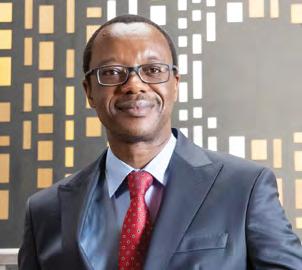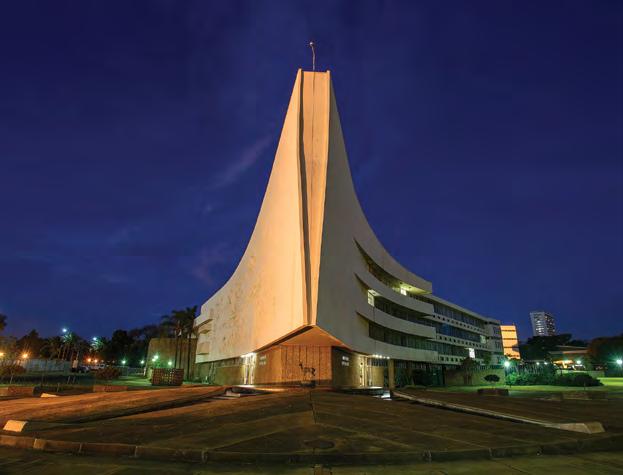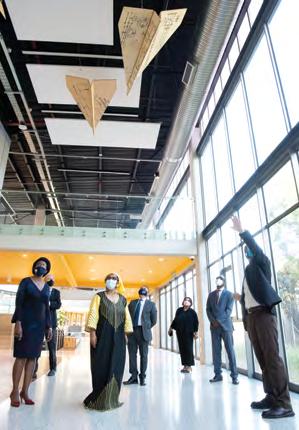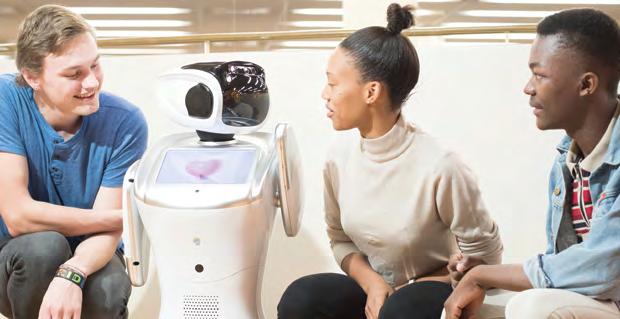
10 minute read
Message from the Vice-Chancellor and Principal
Prof Tawana Kupe
The lingering COVID-19 pandemic, which has extended from 2020 to 2021, has proven to be both a disruptive force and an opportunity to reimagine and reposition UP to secure our short-, medium- and long-term success, vitality and sustainability.
Creating a sustainable university strengthens our core mission of teaching, research and impacting society, and ensures that we adapt to the challenges confronting us, which are complex and interconnected, demanding an ever-evolving approach.
UP views its students and staff as its most valuable
asset and to ensure their continued growth and success, the University has a Financial Sustainability Plan for the period 2019–2025. The key focus areas of the plan include the maximisation of operational efficiencies, costcontainment and the optimisation of all income streams.
The plan was revised to address the financial sustainability challenges that were heightened by COVID-19, and the following are some of the key actions we implemented:
• Reallocating funds to support key priorities; • Fundraising campaigns for bursaries; • Introducing cost-cutting measures; • Launching the Solidarity Fund to provide financial assistance to students and to purchase laptops for them; • Securing external research funding; and • Enhancing the utilisation of digital technologies and platforms to improve services and reduce costs.
The University accelerated implementation of innovative and systemic processes in a direct response to the challenges of the pandemic and the demands of the era. UP’s agility enabled it to advance its strategic imperatives, including developing and implementing a comprehensive COVID-19 master plan and successfully completing the 2020 academic year. The latter achievement was largely attributable to the University’s digitalisation plan, with teaching and learning, research and innovation, and all operational functions pivoting seamlessly onto digital platforms.
Prof Tawana Kupe
Digitalisation is one of the University’s core functions and, today, UP is 99% digitalised, with our Department of Education Innovation (EI) leading the University in the leap from supplementary digital learning to a holistic integration of all modes of learning, such as the Hybrid Flexible (HyFlex) model. This model is designed to allow students to alternate between attending class in person, joining synchronously, online, or asynchronously, viewing the recorded class later.
Foresight in terms of the need to ramp up digitalisation worked in the University’s favour. In 2019, we invested R100 million to upgrade our IT system, as we could see the necessity of being fully digitalised and for our students to be digitally fluent, self-directed and adaptable for a rapidly changing job market. This is one of the reasons that UP consistently ranks among the top four South African universities in the Quacquarelli Symonds (QS) Graduate Employability Survey.
What we could never have anticipated was that our digitalisation system would be put to the test in 2020. By then, 95% of our undergraduate courses already had a substantive online presence as part of our hybrid model. Our system proved robust enough to enable our students to complete the 2020 year, with students accessing more than 3 100 courses 40 million times and submitting 3.5 million assessments. Nearly 7 000 lecture sessions were attended in Blackboard Collaborate (real-time classes online) by almost half a million students who spent close to a million minutes attending the sessions or accessing the recordings.
We are one of the first universities in Africa to implement a learning management system (LMS), which we call clickUP. We are also one of the first universities on the
continent to provide students with mobile access to the LMS, integrate synchronous software and to use real-time learning analytics data to support student success. At UP, we see the current context as a door to experimentation, creativity and innovation in teaching and learning. It requires constant development of the system to determine which courses and programmes at specific levels of study are best taught in a completely online, hybrid or HyFlex mode.
Some practical sessions and laboratory-based research require the use of physical spaces and equipment. However, even these practices are changing due to the rapid advancements in augmented and virtual reality laboratories and knowledge environments.
Maintaining exceptional quality and excellence in all of our core functions is, to a significant extent, dependent

on the knowledge and skills, talent and commitment of our academic, professional and support staff. Attracting, developing and retaining a diverse, quality staff is therefore at the core of UP’s strategic priorities. In support of this, the University Council has made funds available for strategic human capital development initiatives.
In terms of employment equity, total black staff representation has grown from 37.1% in 2012 to 67.8% in 2020, with black academic staff growing from 19.4% to 29%. There has also been pleasing progress in our efforts to improve the percentage of academics with a PhD as their highest qualification, which has increased from 43% in 2012 to 69.6% in 2020. The qualification levels of academic staff have a direct impact on the University’s capacity for research supervision and productivity. The resultant strengthening of the pipeline of postgraduate students to become future academics and researchers is evident in the increase in postgraduate enrolment and graduation figures, and in the postdoctoral fellows appointed to become part of dynamic research teams.
A further measure of quality is the number of researchers who have achieved a National Research Foundation (NRF) rating. UP has 565 NRF-rated researchers, a list that has been growing steadily, year upon year. We not only benefit from the gravitas of our internationally recognised A-rated researchers, but are pleased that our pipeline of talent is constantly replenished by Y-rated researchers (under 40 years) and additions to our P-rated researchers (under 35 years). As a result, UP is considered one of the leading research-intensive universities in South Africa and on the continent as a whole, ranked in the top 1.9% of universities worldwide.
Multi- and transdisciplinary research has always been at the core of our work, but it is now urgent, and it is the responsible way to shape the future of research, specifically on the African continent. The burgeoning interest in transdisciplinary research locally and globally offers a unique opportunity for universities to take the lead in creating new knowledge and new ways of doing things. The trigger is this moment in history, with its focus on a COVID-19-free future, one-world sustainability, and the Fourth Industrial Revolution.
The significant advantage of international collaboration is that it enables universities to make important research and innovation advances by building on each other’s areas of expertise. It also elevates academic facilities to a new level, including teaching and collaborating across continents, using online platforms and video calling in real time. In this environment, information and communications technology is an essential strategic resource for all aspects of university operations.
At UP, our staff and students have proactively pursued trans-institutional and transdisciplinary research in a range of fields. In order to maximise its impact, we have identified a number of themes aligned with the wicked problems of the twenty-first century, international partnerships and areas of research strength, including Food, Nutrition and Well-being; Genomics Research, Zoonotic Diseases, Human Rights and Diversity; and Ecosystem Services and Livelihoods.
UP’s substantial international profile consists of 230 institution-wide international partnerships with collaborators in more than 50 countries across six continents, and more than 4 500 international students from more than 60 countries. Our objective is to build a university that is firmly rooted in internationally recognised, high quality scholarship and for its contributions, through engaged scholarship, in support of thoughtful development in South Africa, on the continent and globally, in particular in the Global South.
World ranking systems have become an integral component of the globalisation of higher education in the twenty-first century. They classify, differentiate and position universities within the global higher education landscape. UP’s interest in these rankings is informed primarily by its overarching vision of becoming a global research player, and, secondly, as a steering mechanism to enhance internal performance by encouraging UP researchers to publish in high-impact journals and embrace important research practices, such as collaborative research and co-authorship with international partners.
Despite the constraints of 2020, the University pursued a considerable number of global engagements and used online platforms to sign institutional agreements that resulted from in-person visits conducted in 2019. During the year, a wealth of events, debates and high-level conferences, webinars and meetings were held.
The University affirmed its leadership and commitment to partnerships to build capacity in Africa, and to accelerate impact at scale so as to achieve the African Union’s Agenda 2063 and the UN’s Sustainable Development Goals (SDGs) in a COVID-19 and post-COVID world. We explored means to navigate the complexity inherent in our sustainable development challenges across all disciplines and were forward-thinking in our reimagining
of universities as both sources of knowledge and education, as well as agents for societal development.
We acknowledge the reality that the complexity we live in is dynamic and uncertain, characterised by unexpected and unpleasant surprises, as we have so clearly experienced with the COVID-19 pandemic. Within this broad and messy milieu, our conversations reinforced the imperative that in being responsive to changing societal needs, our positive impact must be demonstrated in tangible and measurable ways.
With clear intent to be responsive to the SDGs, Agenda 2063 and our continent’s needs, we are exploring – among other areas – pathways of sustainable food systems in Africa, a central challenge to its development. We believe that our deliberations will enable us to make a valuable contribution to the Food Systems Summit which the UN Secretary-General António Guterres will convene in the second half of 2021.
Strategies we adopt for a better world are not built on “business as usual” approaches; future societies are not built on conventional thinking, nor are future solutions to human and global well-being found in outdated, traditional approaches. They require bold thinking and research, and agile, positive shifts. They require the research voices of our universities in Africa to come to the fore with context-appropriate strategies and solutions. It is encouraging to see that this has begun and our voices are being heard.
As UP goes forward, we will build upon the momentum we have created. Our African Vice Chancellor’s Forum forms the basis of a powerful guiding coalition, and we will continue to collaborate and strengthen the partnerships we have formed. UP has all the right fundamentals to become the leading university on our continent and a leader globally. We are resolute that academics, as researchers and teachers, students, as learners and the next generation knowledge leaders, and all who work at UP, are active participants in the transformation that is an inevitable trajectory of universities in South Africa and further afield. This demands excellence and creativity.


Students with Libby, the UP library assistant robot
Thank you to Futhi Mtoba, the 2020 outgoing Chairperson of Council, the new Chairperson, Kuseni Dlamini and every Council member for their support throughout the 2020 pandemic year, a year in which we had to adjust, learn, be agile and responsive to the developing situation to implement a whole new way of doing things. A great deal has been achieved, and we will continue to strive to become a proudly diverse and genuinely inclusive university. As we await our turn to be vaccinated against COVID-19 and limit its destructive impact on our communities, we reiterate our position on the need for strong academic institutions that nurture students and researchers with foresight and wisdom. South Africa and Africa need educated, skilled and well-rounded citizens who see the way forward through collaboration that truly anchors our democratic futures, promotes inclusive economic development, and achieves environmental sustainability and peaceful social progress.
Through all our collaborative efforts we will be able to defeat viruses like COVID-19. There will be more, and we must develop new knowledge to save lives, to live more sustainably, and find a way to create a better life for all. We look forward to increasing our networks, collaborations and partnerships with like-minded institutions, organisations, business and industry, nationally and internationally. Let’s share the gifts of knowledge, innovation and diversity. Let’s make today matter so that in 2025, when we review what we have achieved, we will see the impact we have had in transforming society.
Prof Tawana Kupe
Vice-Chancellor and Principal







